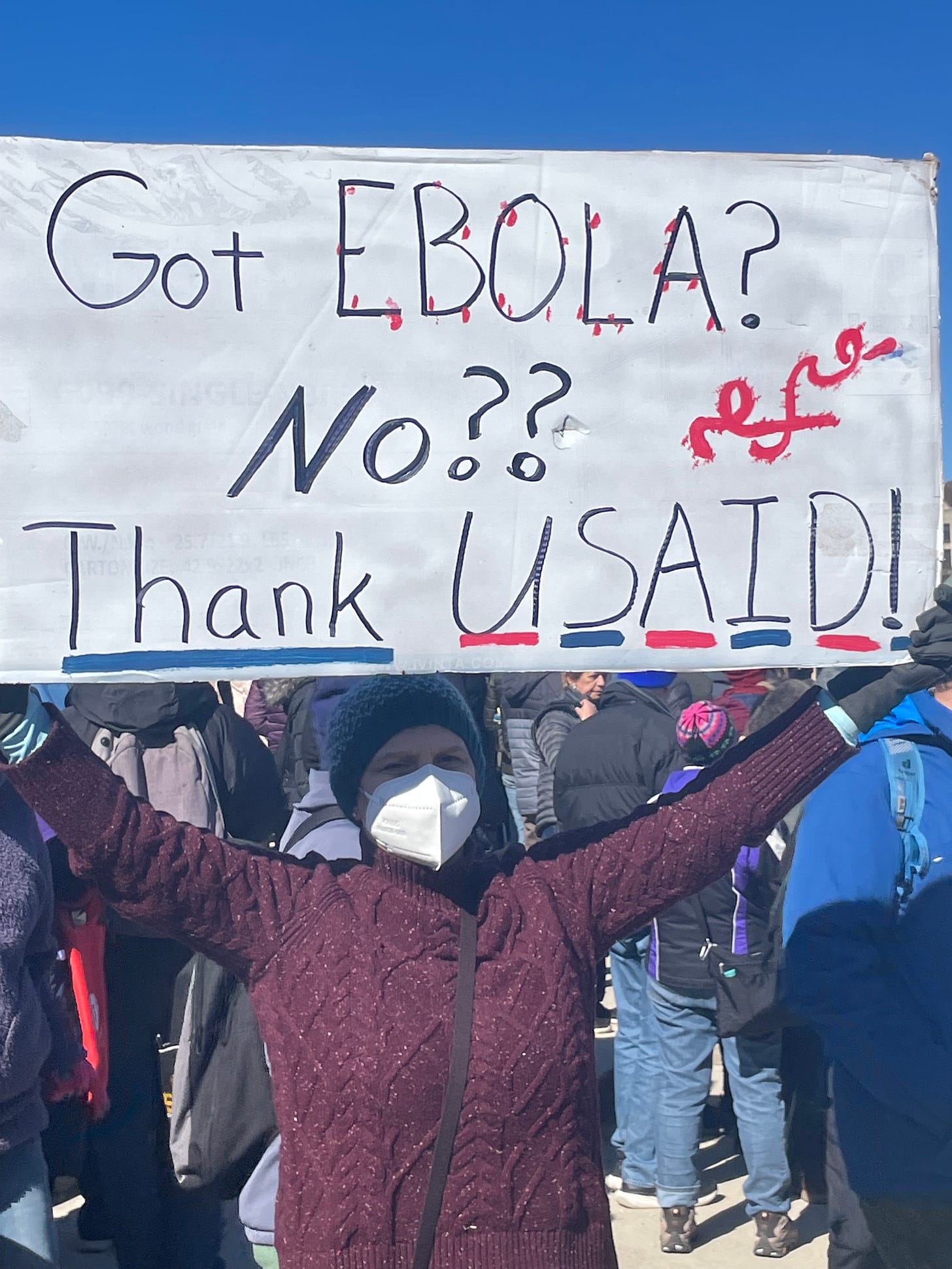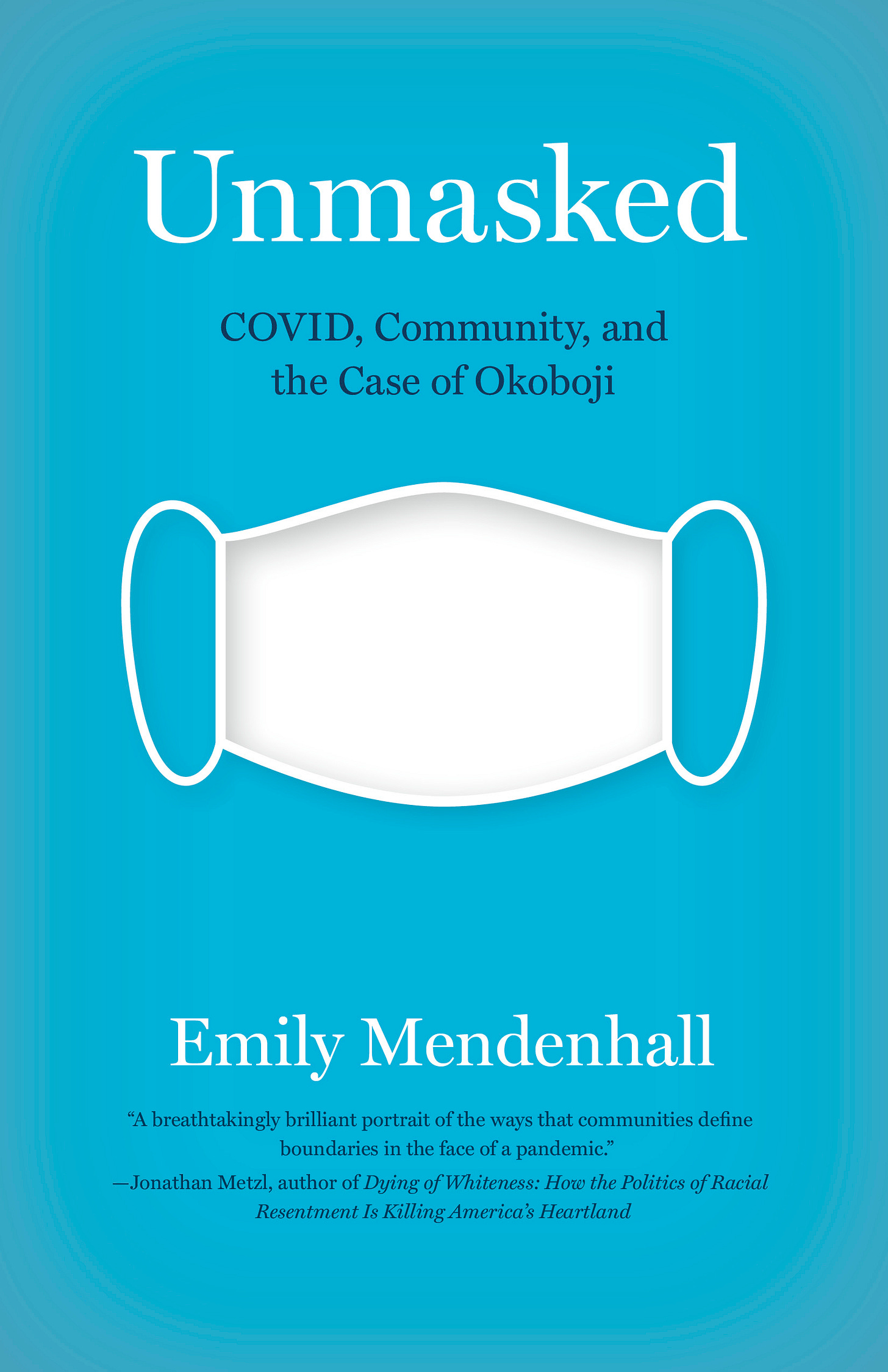Around noon today, I traveled downtown with my family to meet my cousin and some friends for the federal workers protest. We packed the park looking upon the reflection pool facing Congress. There were the typical call and response chants led by a vet with a long grey beard and a “Fuck Trump” sign. There was an old hippy who led the crowd in songs of resistance. Some of the signs were absolutely fantastic—and others were like ours: my daughters worked on them as we made our way downtown. It felt like it did eight years ago, only more unhinged. This time my friends have lost their jobs, and the administration has ripped the heart out of a field I’ve worked in throughout my career.
To be sure, I don’t think USAID always does the right thing (here is a good critique), but ripping the rug from underneath millions of people has caused unimaginable suffering—not only from my friends but the millions of people who rely on life-saving medicines USAID funded. But it’s not only my field—gutting federal workers across the board will have dire consequences.
I don’t think people who live outside of Washington, DC can understand what we are going through. This is the same as any community going through a traumatic experience, such as a wildfire or a tsunami that causes widespread injury and heartache. In this case, however, the federal workforce is experiencing moral injury—a deep slap in the face and dig in the heart for everything people believe in, have long worked for, and devoted their careers to support. It’s too early to say if the American experiment is at risk—indeed, we may be tottering on the brink or simply testing its boundaries. Even still, I can’t stop thinking about the imaginaries that I wrote about in Unmasked at the end of Trump’s last term.
I haven’t written much about my last book project on this blog yet. I wrote a book about the first year of the COVID-19 pandemic in my hometown in northwest Iowa.
At first, during the first several months of the pandemic, most people in the largely White, Christian, and conservative community stayed home and agreed “we are all in this together.” However, by May 2020, when the sun came out and the nearby lakes warmed up, the collective commitment to public health turned to the economy. In Okoboji, many people rely on tourist income from the 100 days of summer to stretch over the year, and losing that income was inconceivable.
Although originally from Okoboji, I am now a medical anthropologist and professor at Georgetown University. Having spent two decades investigating how people perceive and experience illness across contexts, confronting my hometown’s response to the pandemic was fascinating. I arrived in the middle of an outbreak in early June 2020, after having spent time in strict lockdown on the East Coast. I quickly realized that nearly everyone was unmasked and that there was something fundamentally different going on when compared to the locked down city of Washington, D.C., where I’d come from.
But this shouldn’t have been too surprising—Iowa was one of a handful of states that did not enact a formal “stay-at-home” order. Republican Gov. Kim Reynolds closed schools, churches, restaurants, and many retailers for a few weeks in 2020, then quickly reopened, despite warnings from public health officials. Many nonessential offices had stayed open during the pandemic thus far.
My account of this period was published as Unmasked: COVID, Community, and the Case of Okoboji. The book drew on 86 formal interviews, 13 public testimonials, transcripts from school board meetings, observations of behavior and everyday talk, and countless Facebook exchanges. In Okoboji, I talked with business owners and elected officials; people who worked in the hospital and for schools, nonprofits, and health centers; and some who held multiple jobs or shift work at large national or regional stores, restaurants, cafés, gift shops, grocers, or manufacturing plants.
Many people told me, “I don’t fear the virus because I believe in God”—wielding a deeply religious and somewhat magical way of thinking about the virus. Others rejected public health recommendations because of political beliefs as opposed to religious ones, such as a conviction that government overreach was out of hand. A handful of people openly suggested they wished to spread the virus to build immunity across the community. Yet most people took great care in preventing COVID-19 transmission in 2020, especially among loved ones and the most vulnerable in their lives.
I’ve received a mixed bag of responses to this book. On the one hand, I’ve won awards for the book and received wide recognition (such as an hour long segment on Iowa Public Radio and write-ups in Psychology Today) in part because few people wrote an ethnography of that time.
On the other hand, the book is “banned” in my hometown. Nobody in my home town will sell the book. Nobody will talk openly about it (although I’ve had many people covertly whisper into my ear about how they read it or written me a long personal note about how the book made them feel). Even still, the beautiful art my friend Aaron Gronstal created to communicate the book project a wider audience has been banned.
I found this shocking at first, but then when I thought more deeply about the complexities I wrote about in the book, I realized how I have been branded an “outsider” who is untrusted. In fact, an old classmate inspired me to write this entry tonight. After reading something I posted from Bernie Sanders on my FB page, he sent me a DM and accused me of lying about the school board. At first, as a very careful researcher, I was surprised by this accusation (goodness, who does he think I am!? I have transcripts!, I thought). Then, I was reminded of how your credibility can be washed away by so quickly when someone simply doesn’t like what you have to say.
This brought me back to the protest today. I have to believe that the strength of our federal workers can withstand the false accusations and aggressive attempts to silence and slash the institutions that make our American experiment unique. It won’t be today, and it won’t be tomorrow, but I have to think that they will survive the test of time.





Are you for real? USAID has squandered billions upon billions of taxpayer dollars on Gay and Transexual and other woke nonsese, they may have done some good, but the bad far outweighs them, time to get a real job, and stop pick pocketing the taxpayers.